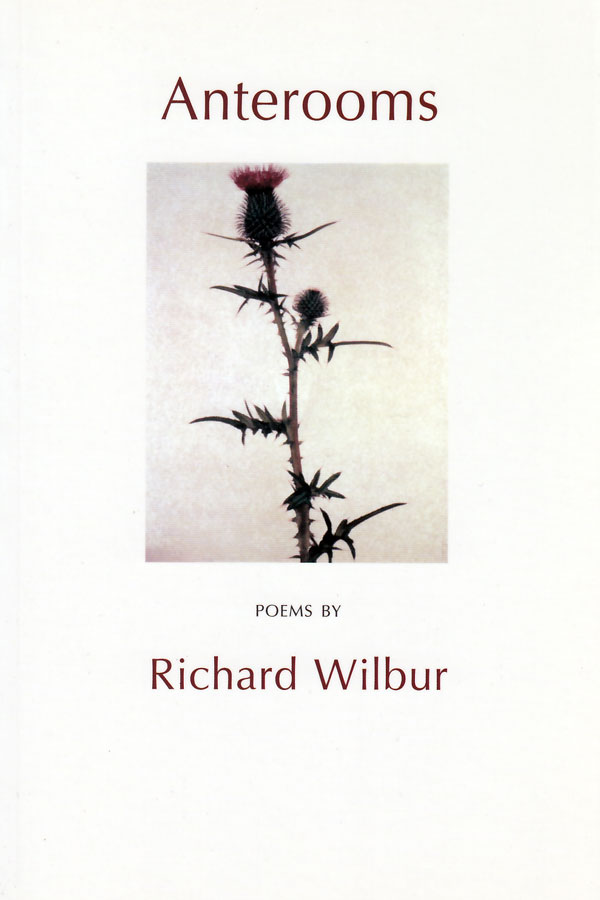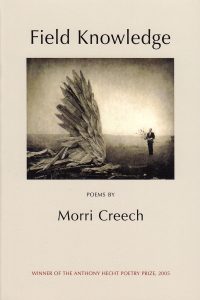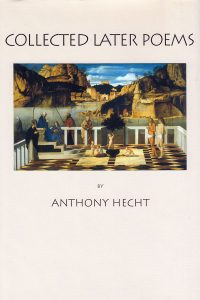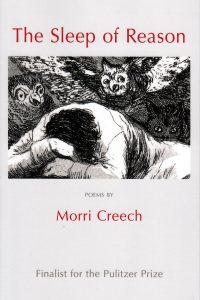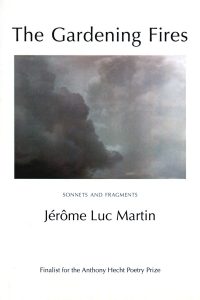Anterooms
£8.99
Poetry lovers and critics will rejoice at the news of this collection from Richard Wilbur, a Pulitzer Prize-winner and former poet laureate of the United States, who was called “a hero to a new generation” by the New York Times Book Review, and whose work – accomplished, whimsical, fresh, and important – was called "one of the saving graces to poetry in our time" by the Washington Post.
A yellow-striped, green measuring worm opens Anterooms, a collection filled with poems that show Wilbur at his best, playing with myth and form and examining the human condition through reflections on nature and love. Anterooms also features masterly translations from Mallarmé’s “The Tomb of Edgar Allan Poe,” a previously unpublished poem by Verlaine, two poems by Joseph Brodsky, and thirty-seven of Symphosius’s clever Latin riddles.
Whether he is considering a snow shovel and domestic life or playfully considering that “Inside homeowner is the word meow,” Wilbur’s new collection is sure to delight everyone, from longtime devotees to casual poetry readers. Exploring the interplay between the everyday and the mythic, the sobering and the lighthearted, Anterooms is nothing less than an event in poetic history and a remarkable addition to a master’s oeuvre.
Anterooms
A new collection by our greatest living poet is cause for wonder and gratitude. Wilbur searches both the natural world and the human heart for hard truths he renders with a matchless grace. Anterooms bursts with a ripened and rueful joy. This is a book not just for your shelves but for the ages.” – J. D. McClatchy
“Richard Wilbur’s imagination has long regarded life in the bud – the seedling, the fledgling, the sprout, the egg … His flowering never ceases to unfold.” – Mary Jo Salter
“When the Roman poet Horace described what a master poet does, he was describing what the American master poet Richard Wilbur does in his wonderful new book. There’s perfection of music and utterance everywhere in these brave, witty, radiant new poems. There’s exaltation here. He makes it look like child’s play.” – David Ferry
“For a long time now, Richard Wilbur has reigned as our finest lyric poet. The title still belongs to him, as Anterooms (what a joy!) proves several times over.” – X. J. Kennedy
“In 1947, Richard Wilbur broke into the literary big leagues with his stunning first collection of poems, The Beautiful Changes; and as Anterooms demonstrates, he is still regularly hitting the ball out of the park sixty-three years later. I can’t think of any other American author who has written so wonderfully well, decade after decade.” – Timothy Steele
Reviews of Anterooms
The Warwick Review, March 2012
"In a publishing life in poetry that is midway through its seventh decade, Richard Wilbur has held fast to core beliefs in the value of beauty, love, the arts of making, and the importance of marrying intellectual and aesthetic esprit to moral conviction … This late harvest, which (as often in the past) includes translations, riddles, and verse intended particularly for children, is perhaps notable for the humility with which it bids farewell to the magnificent architecture of the poetry of Wilbur’s early decades … Anterooms adds to a life’s work of substance and distinction the affecting quietness of a man making his reckoning, in words shorn of splendour, in poetry calm and shriven." – Michael Hulse
TLS, December 23-30, 2011
"[I]t is worth remembering that the American Richard Wilbur has long been one of the finest practitioners of the poem as puzzle. Although there is much about mortality in this gathering of new work and translations from Mallarmé, Verlaine, Horace and Joseph Brodsky, the ninety-year-old has a good deal of fun along the way …These poems often dream, occasionally hymn and sometimes simply hum along to the music of time." – John Greening
Acumen, September 2011
"American poetry of particular interest which has come my way includes [a volume] by Richard Wilbur. Wilbur was ninety earlier this year and has behind him a body of major work … Anterooms carries the subtitle ‘New Poems and Translations’. The translations include a fine version of Mallarme’s ‘Le Tombeau d’Edgar Poe’ and a translation of the tenth poem from the second book of Horace’s Odes, a translation so lucidly and unfussedly done that it (wrongly!) gives the impression that translating Horace is an easy business … Among the original poems it is not surprising to find Wilbur meditating on the passing of time. The deceptive simplicity of lyrics such as ‘A Measuring Worm’, ‘Young Orchard’ and ‘Anterooms’ packs a considerable punch, working largely by understatement. Elsewhere there are lovely poems which pay precise attention to the natural world … All admirers of Wilbur will surely want to acquire this collection." – Glyn Pursglove
Publishers Weekly
"Wilbur, who turns 90 next year, has stood for decades in the front rank of American poets who know how to use traditional forms: his confident rhymes and stanzas are second to none, their poise perhaps unsurpassed since Frost, and like Frost he can combine smooth popular appeal with a startling dark side. One of the best of the new poems, "Terza Rima," remembers a "dead/ Enemy soldier" in WWII whose corpse Wilbur struck with his jeep. Other new poems strive equably to describe the mixed emotions of later life: "Psalm" lauds "the stops of the sweet flute/ Or capering fife," but concludes by asking its musician "in grave relief/ Praise too our sorrows on the/ Cello of shared grief." As in most of his volumes, Wilbur mixes original verse with new translations: "Thirty-Seven Riddles from Symphosius" turns into triple-rhymed pentameter such Latin kennings as "I once was water, and soon shall be again" (i.e., ice). Wilbur, a former poet laureate and Pulitzer winner, has written verse for children, too, and he rounds out the volume with the latest in that line: "If carp is in your carport go find out/ Whether the living room is full of trout." This volume’s gems measure up to Wilbur’s high standards.
New York Times, January 7th 2011
"More than 50 years ago, Randall Jarrell claimed that as a poet, Wilbur “never goes too far, but he never goes far enough.” The observation is invariably quoted whenever Wilbur gets reviewed (far be it from me to break the chain). But to write convincingly about death – and also, as Wilbur has increasingly done, about grief – isn’t a matter of “going” anywhere. It’s a matter of remaining poised in the face of a vast and freezing indifference. And while the strong, spare poems here are unlikely to strike many readers as the illustrious pronouncements of a Grand Old Man – the kind of figure Jarrell had in mind – they are wholly successful in meeting the darkest of subjects with their own quiet light. Which is, surely, a far grander thing." – David Orr
Smartish Pace
"In reading Wilbur, one can’t help but marvel at his erudition, his craftsmanship, and most of all, his joyful appreciation for all existence. Here is a poet whose staunch poetical identity has resulted in great contribution to poetry. Reading Wilbur’s poems demands work, but close readers will surely be rewarded. In time, I am certain that critics will rescue him from the ranks of the underappreciated." – Abigail Licad
The Hopkins Review, Volume 4, Number 3, Summer 2011 (New Series)
"To write serious and engaging poetry over the length of some seven decades is a feat as remarkable as it is rare. The publication of Richard Wilbur’s Anterooms marks just such an accomplishment, though with the modesty and grace that have informed the central mien of his work from the start. A small collection containing sixteen new poems, an excerpt from a musical play, five translated poems, and thirty-seven riddles from the Latin of Symphosius, Anterooms nonetheless touches upon every major theme of Wilbur’s career, be it nature, religion, dreams, love, myths, word play, humor, or time’s inroads on the day’s passing. However, it would be a mistake to regard Wilbur’s new book as merely a gathering of knock-offs from his poetic brand, for as so often is the case in the poems themselves, small matters disguise large, surfaces reveal depths … – Peter Filkins
This yellow-striped green
Caterpillar, climbing up
The steep window screen,
Constantly (for lack
Of a full set of legs) keeps
Humping up his back.
It’s as if he sent
By a sort of semaphore
Dark omegas meant
To warn of Last Things.
Although he doesn’t know it,
He will soon have wings,
And I too don’t know
Toward what undreamt condition
Inch by inch I go.
The Waywiser Press
Psalm
Give thanks for all things
On the plucked lute, and likewise
The harp of ten strings.
Have the lifted horn
Greatly blare, and pronounce it
Good to have been born.
Lend the breath of life
To the stops of the sweet flute
Or capering fife,
And tell the deep drum
To make, at the right juncture,
Pandemonium.
Then, in grave relief,
Praise too our sorrows on the
Cello of shared grief.
The Waywiser Press
Excerpts
A Measuring Worm
This yellow-striped green
Caterpillar, climbing up
The steep window screen,
Constantly (for lack
Of a full set of legs) keeps
Humping up his back.
It’s as if he sent
By a sort of semaphore
Dark omegas meant
To warn of Last Things.
Although he doesn’t know it,
He will soon have wings,
And I too don’t know
Toward what undreamt condition
Inch by inch I go.
The Waywiser Press
Psalm
Give thanks for all things
On the plucked lute, and likewise
The harp of ten strings.
Have the lifted horn
Greatly blare, and pronounce it
Good to have been born.
Lend the breath of life
To the stops of the sweet flute
Or capering fife,
And tell the deep drum
To make, at the right juncture,
Pandemonium.
Then, in grave relief,
Praise too our sorrows on the
Cello of shared grief.
The Waywiser Press

